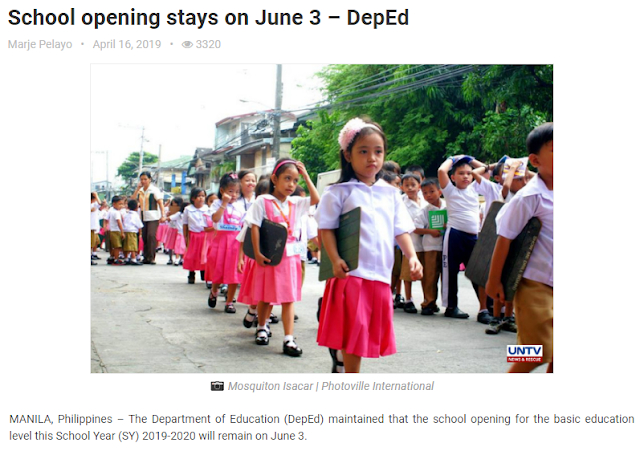With COVID-19, What Should the Philippines DepEd do?
Summer sessions at Georgetown University are now scheduled to be only online. Students enrolled in the General Chemistry laboratory are going to use commercially available laboratory kits so that they can do the experiments at home. COVID-19 has certainly forced us to do something different in education. We still however hope that schools will reopen in the Fall when the new school year begins. The Philippines faces a bigger problem since its school year starts in June. It is likely that measures are still necessary at that time to contain the spread of the novel corona virus. Thus, there is that huge question: What should the Department of Education (DepEd) in the Philippines do?
Apparently, delaying school opening is not on the table. The reason why school cannot start on a later date is the very warm temperature during the months of April and May. Schools in the Philippines are not built for hot weather. There is no airconditioning. Thus, plans like using television and radio broadcasts for delivering lessons are being considered. Internet access is not universal in the country and most pupils do not have access to laptops or desktop computers.
As we experience online K-12 learning in the United States, one thing becomes very clear. We need to prioritize. In a previous post on this blog, "Academic content is secondary to thinking skills", it is important to focus. We no longer have the luxury of drawing enormous lesson plans that cannot be possibly delivered given the circumstances we face. Basic education in the Philippines has been continuously plagued by congestion in the curriculum. Basic education in the Philippines has always been a victim of making high expectations with very limited resources. Now is probably the right time for a genuine prioritization of what needs to be done: First things first. The Philippine Institue for Development Studies (PIDS) has recently released its newsletter for January-March 2020. And here is one of the headlines:
The caption is clear: "Students and teachers alike 'unprepared for the current senior high school curricula, research says". Perhaps, now that we are in the midst of a pandemic, where both resources and avenues for learning are limited, we can hit a pause and truly examine what is important. Perhaps, at this time, we can finally deliver an uncongested curriculum so that our teachers and students can actually accomplish something. Our students may actually learn how to read and write, and how to add, subtract, multiply and divide.
 |
| Above copied from UNTV |
Apparently, delaying school opening is not on the table. The reason why school cannot start on a later date is the very warm temperature during the months of April and May. Schools in the Philippines are not built for hot weather. There is no airconditioning. Thus, plans like using television and radio broadcasts for delivering lessons are being considered. Internet access is not universal in the country and most pupils do not have access to laptops or desktop computers.
As we experience online K-12 learning in the United States, one thing becomes very clear. We need to prioritize. In a previous post on this blog, "Academic content is secondary to thinking skills", it is important to focus. We no longer have the luxury of drawing enormous lesson plans that cannot be possibly delivered given the circumstances we face. Basic education in the Philippines has been continuously plagued by congestion in the curriculum. Basic education in the Philippines has always been a victim of making high expectations with very limited resources. Now is probably the right time for a genuine prioritization of what needs to be done: First things first. The Philippine Institue for Development Studies (PIDS) has recently released its newsletter for January-March 2020. And here is one of the headlines:
 |
| Above copied from PIDS Development Research NewsJanuary-March 2020, Volume 38(1) |
The caption is clear: "Students and teachers alike 'unprepared for the current senior high school curricula, research says". Perhaps, now that we are in the midst of a pandemic, where both resources and avenues for learning are limited, we can hit a pause and truly examine what is important. Perhaps, at this time, we can finally deliver an uncongested curriculum so that our teachers and students can actually accomplish something. Our students may actually learn how to read and write, and how to add, subtract, multiply and divide.
Comments
Post a Comment